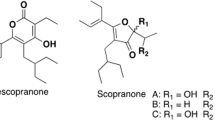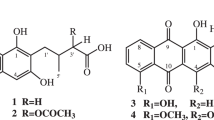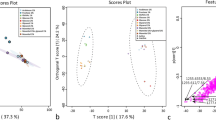Abstract
PAPERS concerned with the microbiological transformation of steroids have appeared frequently in the past seven years; however, no examples of the hydroxylation of steroids with a benzenoid A ring have been observed. We have been able to introduce a hydroxyl group into the 16α-position of œstrone and œstradiol with two strains of Streptomyces halstedii (ATCC 13,499 and NRRL B-2138) and Streptomyces mediocidicus ATCC 13,278.
This is a preview of subscription content, access via your institution
Access options
Subscribe to this journal
Receive 51 print issues and online access
$199.00 per year
only $3.90 per issue
Buy this article
- Purchase on Springer Link
- Instant access to full article PDF
Prices may be subject to local taxes which are calculated during checkout
Similar content being viewed by others
References
Breuer, H., and Nocke, L., Acta Endocrinol., 29, 498 (1958).
Marrian, G. F., Loke, K. H., Watson, E. J. D., and Panattoni, M., Biochem. J., 66, 60 (1957).
Marrian, G. F., Biochem. J., 24, 1021 (1930).
Author information
Authors and Affiliations
Rights and permissions
About this article
Cite this article
KITA, D., SARDINAS, J. & SHULL, G. Introduction of the 16α-Hydroxyl Group into Œstrogens by Streptomycetes. Nature 190, 627–628 (1961). https://doi.org/10.1038/190627b0
Issue Date:
DOI: https://doi.org/10.1038/190627b0
Comments
By submitting a comment you agree to abide by our Terms and Community Guidelines. If you find something abusive or that does not comply with our terms or guidelines please flag it as inappropriate.



